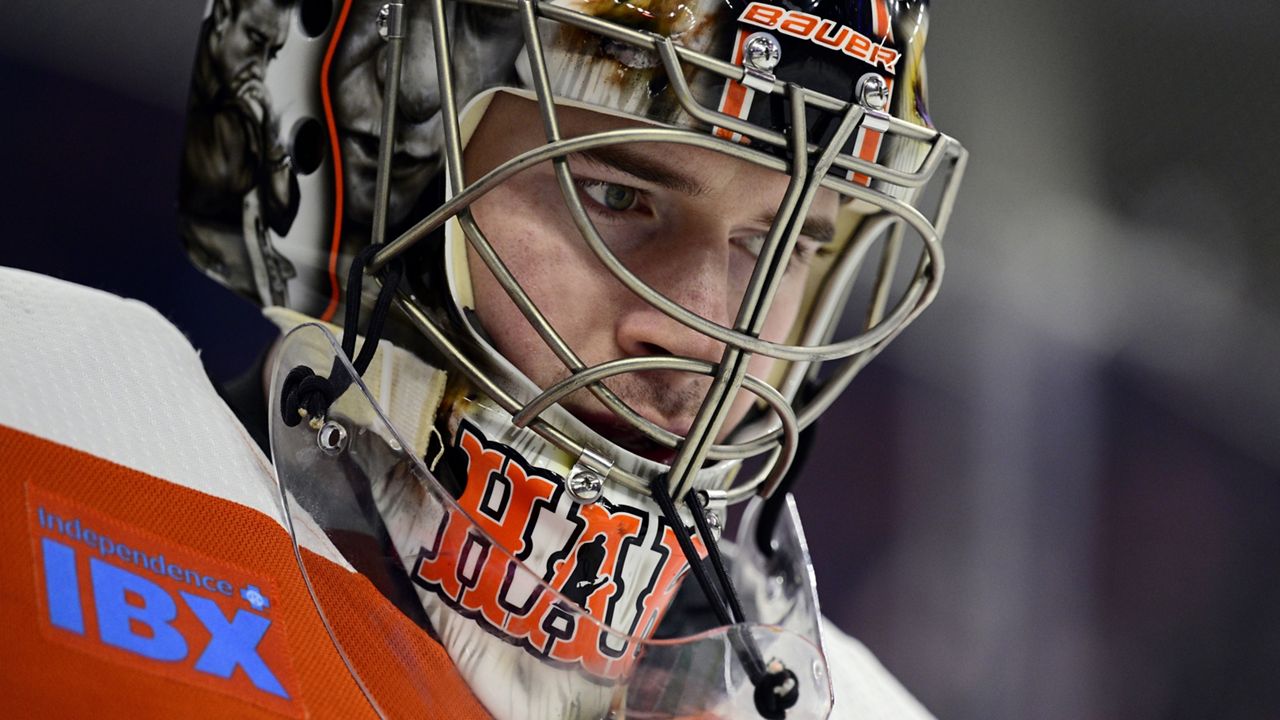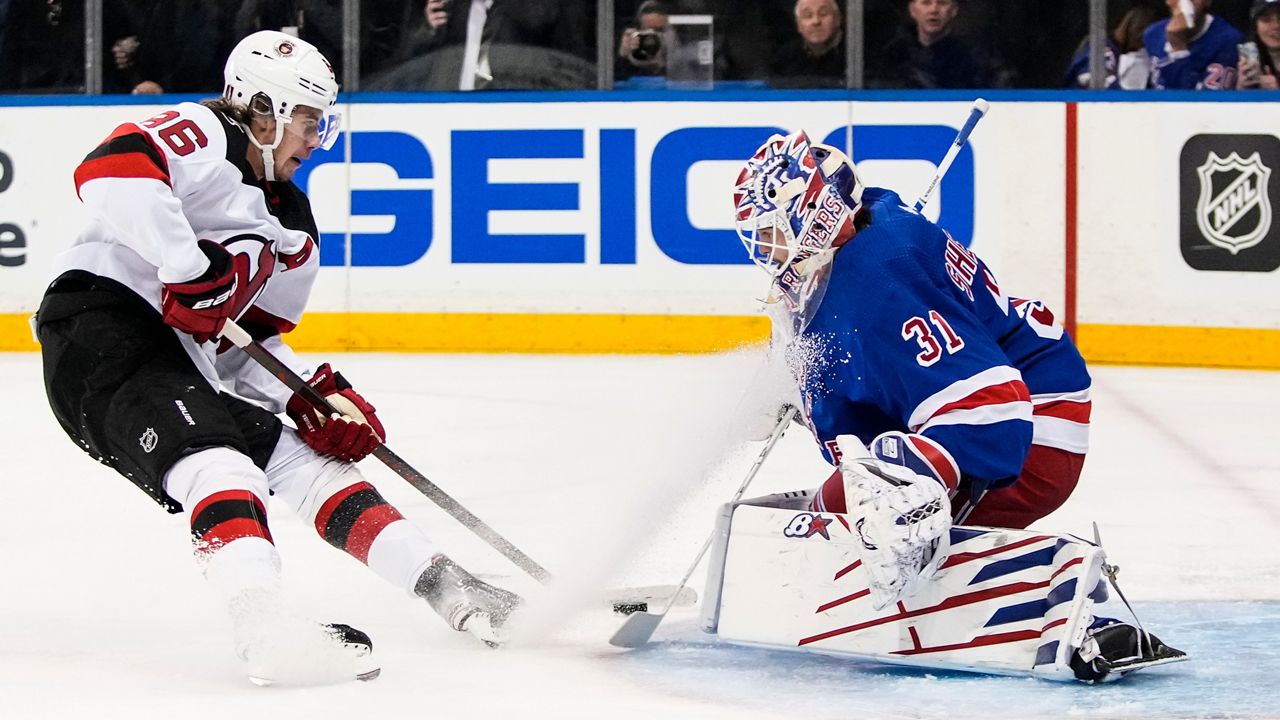CINCINNATI — It was late on the work day on March 13, 2020.
Kristin Ropp was in her office at the recently renamed Heritage Bank Center. She had just recently learned about the COVID-19 pandemic when a promoter of a weekend show made the last-minute decision to cancel their upcoming event.
What You Need To Know
- The Cincinnati Cyclones have not played a home game in 600 days
- Due to capacity restrictions, the team did not play last season
- The team managed to keep players on contract, but only a handful of players from the 2019 team have returned
- The front office called the anticipation ahead of Saturday's night 'surreal'
Ropp isn't only the vice president in charge of overseeing operations of the arena. She’s also the general manager of the Cincinnati Cyclones. The minor-league hockey team practices and plays its home games there. She's been affiliated with the club since 2002.

Guidance regarding handling the eventual pandemic had just started to come out from Ohio Gov. Mike DeWine's office.
Confused, as she puts it, Ropp and her team left for the day. She assumed at the time "it was just for a day or two, maybe a week."
She grabbed her iPad and laptop — nothing else — and turned off the lights. She walks out the door and doesn't look back. Little did she know that would be the last time she stepped foot inside her office for months. They didn't return full-time for more than a year.
Events at Heritage Bank Center were canceled. Contracted vendors and staff were let go. Business, for all intents and purposes, stopped.
Perhaps most devastating to Ropp was that the Cyclones had to stop playing hockey.
The ECHL Board of Governors approved the cancelation of the remainder of the 2019-20 season on March 14, 2020. The Cyclones were in first place in the Central Division at the time.
This weekend, the Cyclones play their first game on their home ice in more than 600 days.
Ropp said she doesn't exactly know what she'll think or say when the first puck drops at face-off around 7:30 p.m. Saturday, but she knows exactly what she'll feel.
"Goosebumps."
"They were testing the horn out while I happened to be walking backstage to chat with those guys for a minute and they blew the horn, probably just to make sure the thing still works, and I got the biggest smile on my face," she said. "I mean, it was the coolest feeling."
Making the decision to not play last season
The ECHL played hockey last season. But the Cyclones and several other clubs in the league made the decision to opt-out.
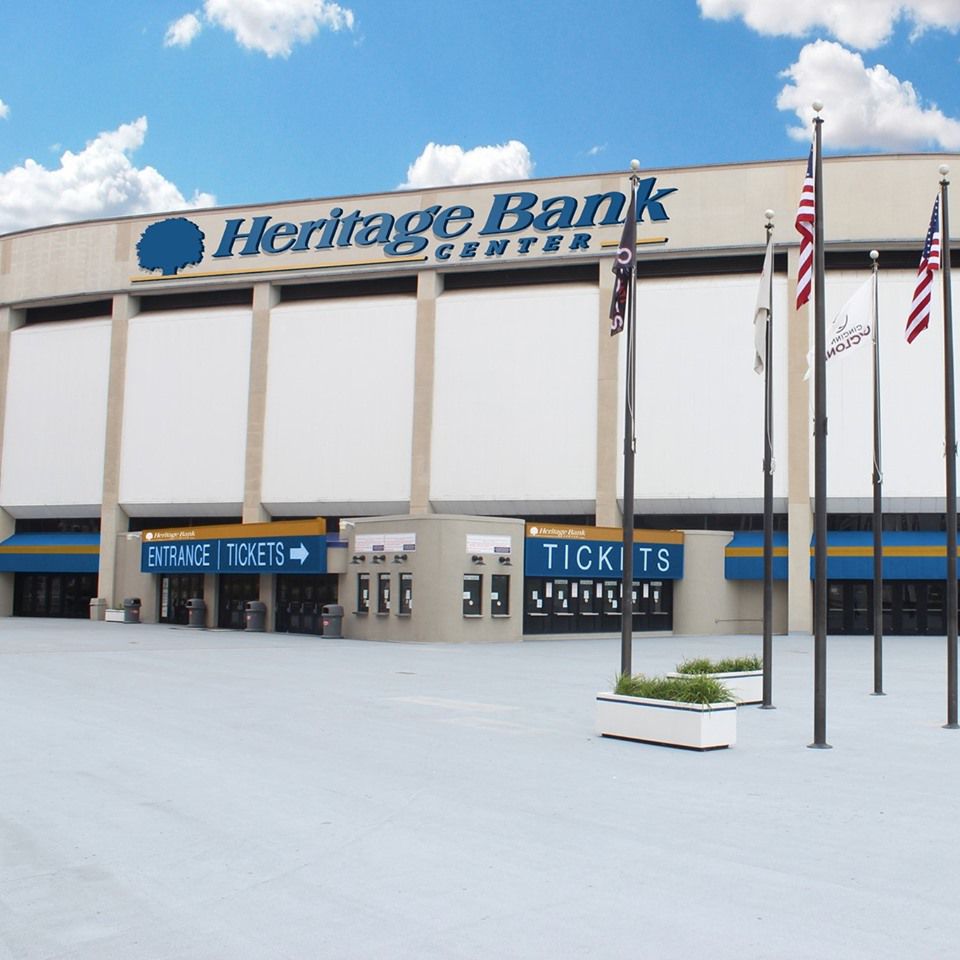
When they made that choice in December 2020, the Cincinnati franchise cited the “safety and health of Cyclones players, staff, and fans.”
Ropp said it would have been difficult to play, but they evaluated “every possible way to make it work.”
At the time, the state of Ohio had limited capacity at Heritage Bank Center to no more than 300 people. That number included players, coaches, vendors, staff and fans.
The Cyclones rely heavily on ticket sales and sponsorship revenue, so playing under those restrictions “didn’t make sense for us financially,” she said. Ohio’s other ECHL club, the Toledo Walleye, decided against playing last season as well.
While it was a business decision, it was more personal than that for Ropp, who’s been with the club and the building team for nearly 20 years.
She said casting the vote not to play at the ECHL Board of Governors meeting was a difficult day for her and the franchise.
“I knew the ramifications; casting that vote and choosing not to play was going to result in furloughs and a lot of negativity,” she said. “I’ve been here since 2002, and the last thing I wanted to do was take someone's livelihood away.”
Putting the Cyclones sweater back on again
Not every team ceased operations last season. In total, 14 of the league’s 26 teams took part in the abridged season.
Players under contract with teams that opted-out were given the opportunity to try to catch on with another team that was playing. One of those players was Justin Vaive, the Cyclones' captain who’s also designated as a player/assistant coach.
Vaive, 32, spent last season with the Fort Wayne Komets. He helped that team win its first Kelly Cup (league championship), posting six points in 13 playoff games. He had 18 points in 47 regular season games.
The way the contracts were set up, the Cyclones had the option to retain Vaive and any of the players they would have had under contract last season.
“Winning a championship made all the sacrifices over the past year well worth it,” Vaive said. “Getting a taste of winning fuels the fire to want and continue that here with the Cyclones. I can’t wait to get back into Cincinnati and be able to experience the crowds that I love so much.”
After his first preseason game with the Cyclones earlier this month, Vaive said returning to Heritage Bank Center after 19 months away felt “surreal.”

"It was different but a good different,” he said. “We're still getting into it but just to get out there and see some familiar faces in the crowd and hear the noise and stuff, it was just a great experience all around.”
Vaive voiced some surprise with how comfortable he felt being back “home.” He’s played in Cincinnati for parts of six seasons and skated with the ‘Clones for about 220 contests.
“It’s just all those superstitions or habits or game day routines you develop over the years, get thrown out the window when you're at a new rink, new city, all that. Coming back here, it felt familiar,” he said.
In all, the Cyclones brought back a handful of veteran players, including Jesse Schultz who played 17 games for Greenville Swamp Rabbits this past season. Schutlz, a 19-year veteran, won the 2018-19 ECHL MVP award in Cincinnati.
“We've had success over the last three, four seasons and a couple of guys, like (Schultz), that are returning have been big parts of those teams,” he said. “Any time you can bring back veteran leadership, it’s just huge.”
The Cyclones brought 30 people into training camp and the current roster has 22 players. Most of them already started skating with the team over the past few weeks.
“I can’t wait to experience the Cincinnati crowds that I love so much,” he said. “This city has always had a soft spot in my heart and will continue to long after I retire.”
Getting butts back in the seats
The Cincinnati Cyclones have always been a good draw. They typically attract between 5,000 to 8,000 fans. It can be even more at times, especially on Friday $1 beer nights.
Cincinnati can be a difficult draw for sports clubs even when they’re on top of the world. Being a minor-league franchise coming out of a pandemic? It’s anyone’s guess.
Ropp said before the start of the season earlier this month, they hadn't spent "a dime" on marketing or advertising in 18 months. In addition to being a way to conserve money, there was also no product to sell at the time.
As the Cyclones’ marketing director, Sean Sean Lynn, had his hands full. He had to find a way to engage hockey fans and connect with the community without their being games or special promotions. Most of the team’s players weren’t even in town.
“Last year, we really tried to put an emphasis on connecting with our fan base via social media. And that certainly gets you to a certain point, but the other part of it is still being a contributing member of the community,” he said.
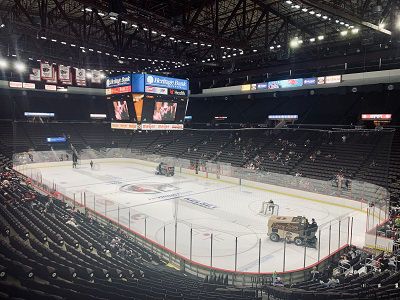
Lynn gave examples of seeking out volunteer opportunities, such as Freestore Foodbank and Sweet Cheeks Diaper Bank, to help give back.
“Probably our front office’s favorite was helping out at the Ronald McDonald House,” he said. “It had a big impact, so much so that we decided to partner up with them for a game this year.
Lynn said one of the current residents of Ronald McDonald House will design a jersey that the Cyclones will wear on the ice.
Beyond charity, Lynn said the organization wanted to find ways to reconnect with fans and find ways to reassociate the Cincinnati Cyclones with a fun time.
This past August they hosted their first Cyclones Un-Frozen 5K/10K race. The race took place outside Heritage Bank Center.
“We traditionally do our Frozen 5K/10K in February, so it was a little warmer this year, but we had a great turnout. We wanted to use it as an unofficial ‘welcome back’ to the fans,” he said.
Get your peanuts, hot dogs and beer … somewhere
For the Cyclones, the on-ice stuff sort of took care of itself. The challenges were with the other business-related logistics; hiring suppliers, making sure they could get their giveaway items and training security staff.
“There are so many things to consider, which is kind of weird. This is something some of us have been doing pretty much every day for years and now, seemingly overnight, you just have to stop and think about what you’re doing,” Ropp said.
She gave a lot of credit to her four-person operations team who took care of the five-floor building. Ropp said while the building wasn’t always what she called “show ready,” everything always worked and was within a few hours of being presentable.
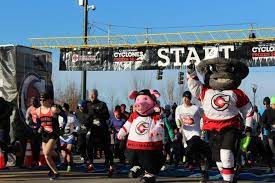
They had to make sure the building itself was ready for game day. Ropp said they kept the HVACs in check, maintained building and lighting and made sure the toilets were flushed every day.
“I mean, it's the non-sexy stuff that’s got to be done. This is a five-floor building with a lot of rooms and areas that weren’t being used for an 18-month stretch. Credit to our team for making sure this place didn’t fall apart,” she said.
One of the big issues was food and beverage vendors. Ropp said they had some existing contracts with companies, like Aramark Entertainment. Even when nothing was on the schedule at the Heritage Bank Center, the company would stay in contact “just in case something pops up next week,” Ropp said.
“They understood that, for a while, the building wasn't seeing any revenue or business, but they just continued to help us out along the way and were ready to go when we needed them.” she said.
One of the biggest challenges, Ropp said, had to do with simply getting materials to sell and giveaway. Supply-chain issues are affecting restaurants and retailers all over the country -- and Heritage Bank Center is no different.
“The cost of doing business has simply increased. From additional disinfecting measures to labor increases, things are different than before the pandemic,” Ropp said. She gave the example of white T-shirts. She didn’t know why but she was told by the company that does their merchandise that the cost of those T-shirts is expected to go up.
Free giveaways and inexpensive foods are important for minor league teams, especially in a bigger city where they’re often competing with other sources of entertainment.
Ropp said the price may go up a “a quarter or two” as a result of the challenges, but her goal is to keep it as low as possible compared to the other event complexes around town.
“We’re excited to have people back in our seats on Saturday and we hope they come back a few more times this season,” she said.
The Cincinnati Cyclones will play 36 regular-season home games this season.





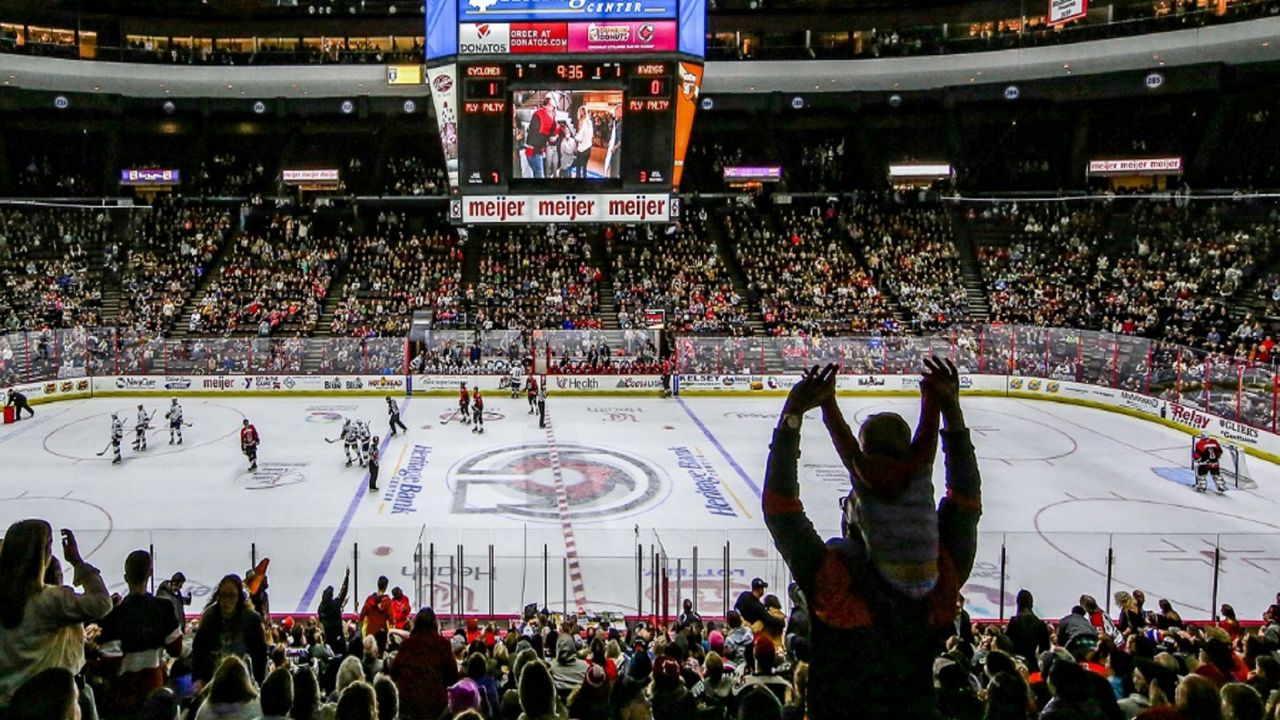
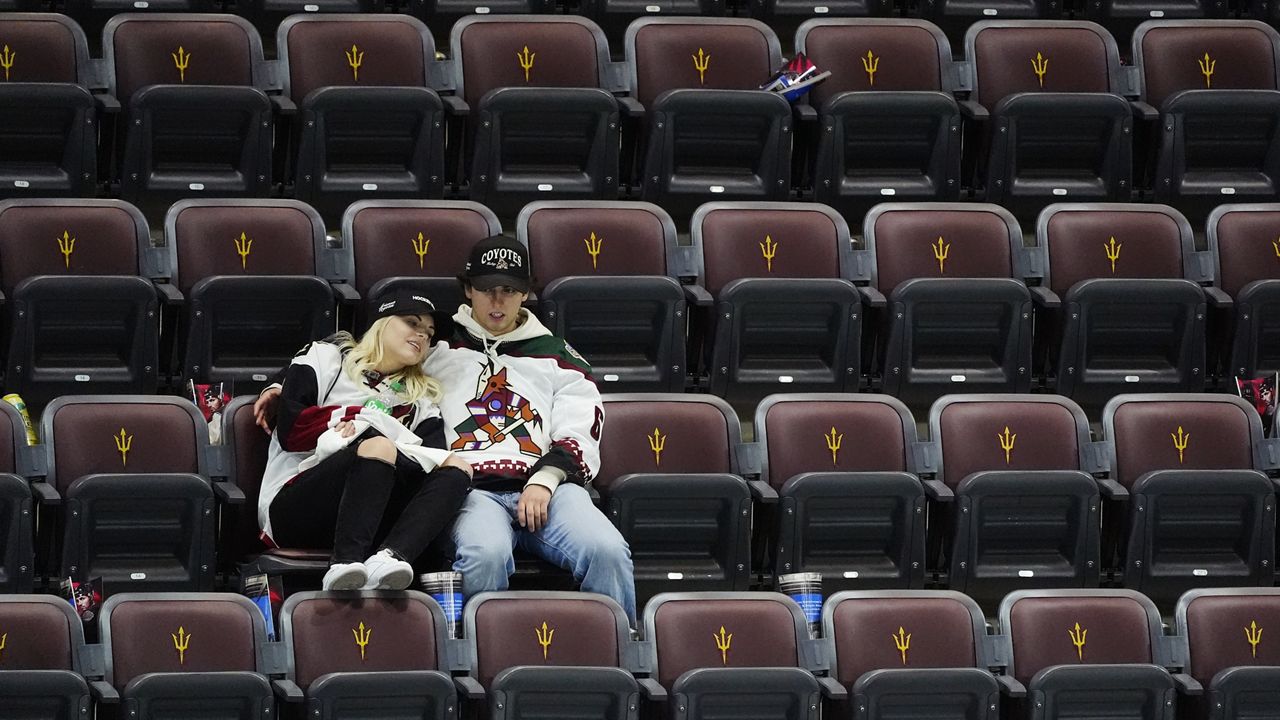
)
